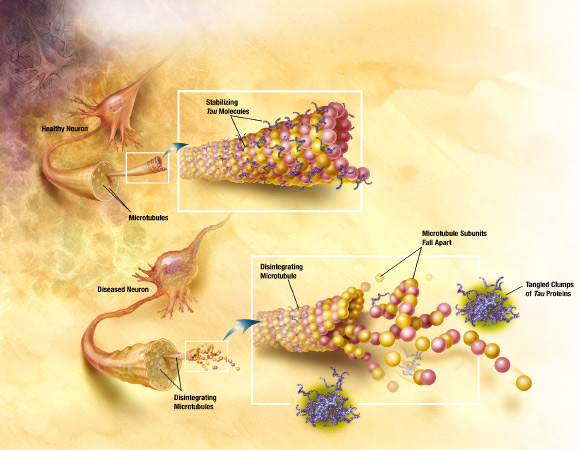An international team of researchers from the United States and Australia has made a successful vaccine formulation that targets pathological proteins associated with Alzheimer’s disease.

In AD, changes in tau protein lead to the disintegration of microtubules in brain cells. Image credit: Alzheimer’s Disease Education and Referral Center / National Institute on Aging.
Alzheimer’s disease (AD) is the most common cause of dementia, and worldwide nearly 46 million people have Alzheimer’s or related dementias and this number is estimated to increase to 131.5 million by 2050.
Currently, the majority of neuroscientists agree that the optimal targets for AD immunotherapy are pathological forms of β-amyloid (Aβ) and tau molecules.
Aβ is a protein found to be prominent in driving AD, but the accumulation of pathological tau also correlates with the formation of dementia in Alzheimer’s patients.
Flinders University School of Medicine researcher Prof. Nikolai Petrovsky and his colleagues have developed an ‘exceptional’ universal vaccine platform, called MultiTEP, to target aberrant forms of Aβ and tau. Their results were published in the July 1 issue of the journal Scientific Reports.
“If we are successful in pre-clinical trials, in three to five years we could be well on the way to one of the most important developments in recent medical history,” said Prof. Petrovsky, who is also the Chairman and Research Director of Australian vaccine research company Vaxine Pty Ltd.
“Along with our rapidly ageing populations, we now know that the explosion in type 2 diabetes in the West is likely to further dramatically fuel the projected rise in the number of cases of dementia globally, with diabetes being the major risk factor for AD.”
“Using a combination of anti-β-amyloid and anti-tau vaccines with powerful and safe adjuvant technology called Advax™ developed by Vaxine Pty Ltd shows promise for both preventive and therapeutic approaches in AD,” said co-author Prof. David Cribbs, from the Institute for Memory Impairments and Neurological Disorders at the University of California, Irvine.
“The MultiTEP platform-based vaccines do not induce potentially harmful auto-reactive cellular immune responses, while still generating antibodies that bind strongly to the amyloid and tau pathological molecules in brain tissue from AD patients,” said senior author Prof. Michael Agadjanyan, from the Institute for Memory Impairments and Neurological Disorders at the University of California, Irvine, and the Institute for Molecular Medicine.
“This study suggests that we can immunise patients at the early stages of AD, or even healthy people at risk for AD, using our anti-Aβ vaccine, and, if the disease progresses, then vaccinate with another anti-tau vaccine to increase effectiveness,” added senior author Dr. Anahit Ghochikyan, from the Institute for Molecular Medicine.
“We are working with experts from four companies to conduct non-clinical safety-toxicology studies to fulfil U.S. Government safety standards for the Investigational New Drug application.”
“After completion of these pre-clinical studies, we plan to test the immunogenicity and efficacy of the new vaccines in human trials.”
_____
H. Davtyan et al. 2016. Alzheimer’s disease AdvaxCpG- adjuvanted MultiTEP-based dual and single vaccines induce high-titer antibodies against various forms of tau and Aβ pathological molecules. Sci. Rep. 6, 28912; doi: 10.1038/srep28912







